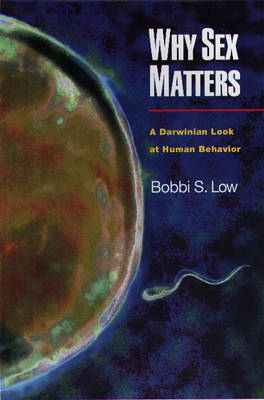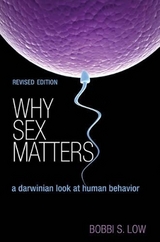
Why Sex Matters
A Darwinian Look at Human Behavior
Seiten
1999
Princeton University Press (Verlag)
978-0-691-02895-8 (ISBN)
Princeton University Press (Verlag)
978-0-691-02895-8 (ISBN)
- Titel erscheint in neuer Auflage
- Artikel merken
Zu diesem Artikel existiert eine Nachauflage
Bobbi Low ranges from ancient Rome to modern America, from the Amazon to the Arctic, and from single-celled organisms to international politics to show that many questions about human behaviour largely come down to evolution and sex.
Why are men, like other primate males, usually the aggressors and risk takers? Why do women typically have fewer sexual partners? Why is killing infants routine in some cultures, but forbidden in others? Why is incest everywhere taboo? Bobbi Low ranges from ancient Rome to modern America, from the Amazon to the Arctic, and from single-celled organisms to international politics to show that these and many other questions about human behavior largely come down to evolution and sex. More precisely, as she shows in this uniquely comprehensive and accessible survey of behavioral and evolutionary ecology, they come down to the basic principle that all organisms evolved to maximize their reproductive success and seek resources to do so.
Low begins by reviewing the fundamental arguments and assumptions of behavioral ecology: selfish genes, conflicts of interest, and the tendency for sexes to reproduce through different behaviors. She explains why in primate species--from chimpanzees and apes to humans--males seek to spread their genes by devoting extraordinary efforts to finding mates, while females find it profitable to expend more effort on parenting. Low illustrates these sexual differences among humans by showing that in places as diverse as the parishes of nineteenth-century Sweden, the villages of seventeenth-century China, and the forests of twentieth-century Brazil, men have tended to seek power and resources, from cattle to money, to attract mates, while women have sought a secure environment for raising children. She makes it clear, however, they have not done so simply through individual efforts or in a vacuum, but that men and women act in complex ways that involve cooperation and coalition building and that are shaped by culture, technology, tradition, and the availability of resources. Low also considers how the evolutionary drive to acquire resources leads to environmental degradation and warfare and asks whether our behavior could be channeled in more constructive ways.
Why are men, like other primate males, usually the aggressors and risk takers? Why do women typically have fewer sexual partners? Why is killing infants routine in some cultures, but forbidden in others? Why is incest everywhere taboo? Bobbi Low ranges from ancient Rome to modern America, from the Amazon to the Arctic, and from single-celled organisms to international politics to show that these and many other questions about human behavior largely come down to evolution and sex. More precisely, as she shows in this uniquely comprehensive and accessible survey of behavioral and evolutionary ecology, they come down to the basic principle that all organisms evolved to maximize their reproductive success and seek resources to do so.
Low begins by reviewing the fundamental arguments and assumptions of behavioral ecology: selfish genes, conflicts of interest, and the tendency for sexes to reproduce through different behaviors. She explains why in primate species--from chimpanzees and apes to humans--males seek to spread their genes by devoting extraordinary efforts to finding mates, while females find it profitable to expend more effort on parenting. Low illustrates these sexual differences among humans by showing that in places as diverse as the parishes of nineteenth-century Sweden, the villages of seventeenth-century China, and the forests of twentieth-century Brazil, men have tended to seek power and resources, from cattle to money, to attract mates, while women have sought a secure environment for raising children. She makes it clear, however, they have not done so simply through individual efforts or in a vacuum, but that men and women act in complex ways that involve cooperation and coalition building and that are shaped by culture, technology, tradition, and the availability of resources. Low also considers how the evolutionary drive to acquire resources leads to environmental degradation and warfare and asks whether our behavior could be channeled in more constructive ways.
At the University of Michigan, Bobbi S. Low is Professor of Resource Ecology at the School of Natural Resources and Environment, Associate Director of the Population Environment Dynamics Program, and Faculty Associate at several centers within the Institute for Social Research. She is an associate editor for Politics and the Life Sciences and for Population and Environment. She is the author, with Alice Clarke and Ken Lockridge, of Family Patterns in Nineteenth-Century Sweden.
| Zusatzinfo | 3 halftones, 18 line illus., 2 tables |
|---|---|
| Verlagsort | New Jersey |
| Sprache | englisch |
| Maße | 152 x 229 mm |
| Gewicht | 765 g |
| Themenwelt | Sachbuch/Ratgeber ► Natur / Technik ► Naturwissenschaft |
| Naturwissenschaften ► Biologie ► Evolution | |
| Naturwissenschaften ► Biologie ► Humanbiologie | |
| Sozialwissenschaften ► Ethnologie | |
| Sozialwissenschaften ► Soziologie | |
| ISBN-10 | 0-691-02895-8 / 0691028958 |
| ISBN-13 | 978-0-691-02895-8 / 9780691028958 |
| Zustand | Neuware |
| Haben Sie eine Frage zum Produkt? |
Mehr entdecken
aus dem Bereich
aus dem Bereich



